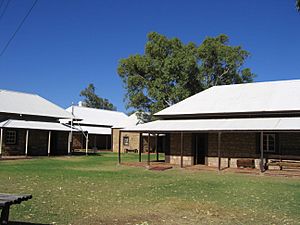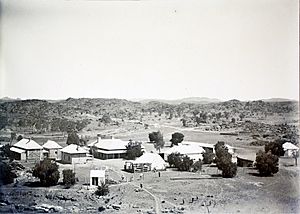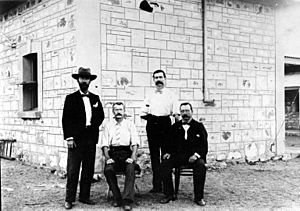Alice Springs Telegraph Station facts for kids
The Alice Springs Telegraph Station is a special historical place located about four kilometres north of the Alice Springs town centre in the Northern Territory of Australia. It was built in 1872 to send messages between Darwin and Adelaide. This station was the very first European settlement in central Australia. It was one of twelve stations along the important Australian Overland Telegraph Line.
Contents
History of the Telegraph Station
For thousands of years, the Arrernte people have lived in the Alice Springs area. They are the traditional owners of this land.
European explorers started looking around central Australia in 1860. A brave explorer named John McDouall Stuart successfully crossed Australia from north to south in 1863. He went through the MacDonnell Ranges. Later, in March 1871, a surveyor named William Mills was looking for a good path for the Overland Telegraph Line. He found a waterhole, which was a very important place for the local Aboriginal people. They called it Turiara.
Mills named this waterhole Alice Springs after Alice Todd. She was the wife of his boss, Charles Todd, who was in charge of the big telegraph project.
Building the Station
Construction of the telegraph station began right next to the waterhole in November 1871. Gilbert Rotherdale McMinn supervised the building work. Many buildings were put up, including a telegraph office, a kitchen, and a home for the station master. Since supplies only arrived once a year from Adelaide, it was very important for the people living there to be able to grow their own food and look after themselves. They built stockyards and a large garden. A well was also dug to make sure they always had water, even during dry times.
The telegraph station worked for 60 years, sending messages across the country.
Station Managers (Postmasters)
Many different people managed the Alice Springs Telegraph Station over the years. They were called Postmasters. Here are some of them:
| Postmasters | From | To |
|---|---|---|
| Johannes Ferdinand Mueller | 1 July 1875 | 31 August 1879 |
| Ernest Ebenezer Samuel Flint | 1 September 1879 | 17 July 1887 |
| Joseph Skinner | 1 September 1887 | 30 November 1892 |
| Francis James Gillen | 1 December 1892 | 31 March 1899 |
| Thomas Andrew Bradshaw | 1 April 1899 | 1908 |
| John McKay | 17 July 1908 | 1916 |
| Frederick Alfred Price | 1916 | 1924 |
| Ernest Allchurch | 1924 | 1932 |
Mueller was the first postmaster. A street in Alice Springs, Mueller Street, is named after him.
Bradshaw, another postmaster, started working for the Post and Telegraph Department in 1878. He became the postmaster of the Alice Springs Telegraph Station in 1899. Bradshaw Primary School in Alice Springs is named after him.
The Bungalow: A Home for Children
The telegraph station stopped operating in 1932. After that, the buildings were used as a home and school for Aboriginal children. This place was known as The Bungalow. It had moved from another location called Jay Creek. An area of 273 hectares, including the telegraph station, became an Aboriginal reserve in 1932. Its goal was to provide a place to live and education for Aboriginal children.
The Freemans were the first Superintendent and Matron (like a principal and caretaker) at this new location. The Bungalow closed in 1942 because of World War II. Most of the children were moved to places further south, like Mulgoa in New South Wales and Balaklava in South Australia. The Australian Army then took over the buildings.
World War II and Beyond
During World War II, from 1942 to 1945, parts of the station were used by the Australian Army. After the war, in 1945, the station was given back to the Native Affairs Department. It remained an Aboriginal Reserve until 1963. At that time, many Aboriginal people moved to Amoonguna, an Aboriginal Community southeast of Alice Springs.
The Station Today
Today, the Alice Springs Telegraph Station is part of the Alice Springs Telegraph Station Historical Reserve. This area was officially made a reserve in 1962. Many of the old stone buildings have been carefully restored.
The historical reserve was listed on the Register of the National Estate in 1980 and on the Northern Territory Heritage Register in 2004. Now, it is a popular place for tourists to visit. It also has a cafe and is a great spot for mountain biking.
See Also
 | DeHart Hubbard |
 | Wilma Rudolph |
 | Jesse Owens |
 | Jackie Joyner-Kersee |
 | Major Taylor |




